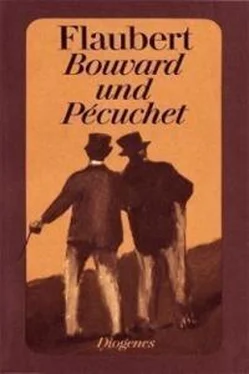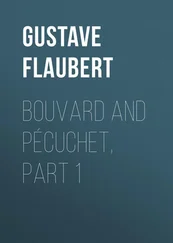"Bravo! I expected that."
At their age they could not undertake such studies; and the smile that accompanied these words wounded them deeply.
What right had he to consider them incapable? Did science belong to this gentleman, as if he were himself a very superior personage? Then, accepting his challenge, they went all the way to Bayeux to purchase books there. What they required was physiology, and a second–hand bookseller procured for them the treatises of Richerand and Adelon, celebrated at the period.
All the commonplaces as to ages, sexes, and temperaments appeared to them of the highest importance. They were much pleased to learn that there are in the tartar of the teeth three kinds of animalcules, that the seat of taste is in the tongue, and the sensation of hunger in the stomach.
In order to grasp its functions better, they regretted that they had not the faculty of ruminating, as Montègre, M. Gosse, and the brother of Gerard had; and they masticated slowly, reduced the food to pulp, and insalivated it, accompanying in thought the alimentary mass passing into their intestines, and following it with methodical scrupulosity and an almost religious attention to its final consequences.
In order to produce digestion artificially, they piled up meat in a bottle, in which was the gastric juice of a duck, and they carried it under their armpits for a fortnight, without any other result save making their persons smell unpleasantly. You might have seen them running along the high–road in wet clothes under a burning sun. This was for the purpose of determining whether thirst is quenched by the application of water to the epidermis. They came back out of breath, both of them having caught cold.
Experiments in hearing, speech, and vision were then made in a lively fashion; but Bouvard made a show–off on the subject of generation.
Pécuchet's reserve with regard to this question had always surprised him. His friend's ignorance appeared to him so complete that Bouvard pressed him for an explanation, and Pécuchet, colouring, ended by making an avowal.
Some rascals had on one occasion dragged him into a house of ill–fame, from which he made his escape, preserving himself for the woman whom he might fall in love with some day. A fortunate opportunity had never come to him, so that, what with bashfulness, limited means, obstinacy, the force of custom, at fifty–two years, and in spite of his residence in the capital, he still possessed his virginity.
Bouvard found difficulty in believing it; then he laughed hugely, but stopped on perceiving tears in Pécuchet's eyes—for he had not been without attachments, having by turns been smitten by a rope–dancer, the sister–in–law of an architect, a bar–maid, and a young washerwoman; and the marriage had even been arranged when he had discovered that she was enceinte by another man.
Bouvard said to him:
"There is always a way to make up for lost time. Come—no sadness! I will take it on myself, if you like."
Pécuchet answered, with a sigh, that he need not think any more about it; and they went on with their physiology.
Is it true that the surfaces of our bodies are always letting out a subtle vapour? The proof of it is that the weight of a man is decreasing every minute. If each day what is wanting is added and what is excessive subtracted, the health would be kept in perfect equilibrium. Sanctorius, the discoverer of this law, spent half a century weighing his food every day together with its excretions, and took the weights himself, giving himself no rest, save for the purpose of writing down his computations.
They tried to imitate Sanctorius; but, as their scales could not bear the weight of both of them, it was Pécuchet who began.
He took his clothes off, in order not to impede the perspiration, and he stood on the platform of the scales perfectly naked, exposing to view, in spite of his modesty, his unusually long torso, resembling a cylinder, together with his short legs and his brown skin. Beside him, on his chair, his friend read for him:
"'Learned men maintain that animal heat is developed by the contractions of the muscles, and that it is possible by moving the thorax and the pelvic regions to raise the temperature of a warm bath.'"
Bouvard went to look for their bathing–tub, and, when everything was ready, plunged into it, provided with a thermometer. The wreckage of the distillery, swept towards the end of the room, presented in the shadow the indistinct outlines of a hillock. Every now and then they could hear the mice nibbling; there was a stale odour of aromatic plants, and finding it rather agreeable, they chatted serenely.
However, Bouvard felt a little cool.
"Move your members about!" said Pécuchet.
He moved them, without at all changing with the thermometer. "'Tis decidedly cold."
"I am not hot either," returned Pécuchet, himself seized with a fit of shivering. "But move about your pelvic regions—move them about!"
Bouvard spread open his thighs, wriggled his sides, balanced his stomach, puffed like a whale, then looked at the thermometer, which was always falling.
"I don't understand this at all! Anyhow, I am stirring myself!"
"Not enough!"
And he continued his gymnastics.
This had gone on for three hours when once more he grasped the tube.
"What! twelve degrees! Oh, good–night! I'm off to bed!"
A dog came in, half mastiff, half hound, mangy, with yellowish hair and lolling tongue.
What were they to do? There was no bell, and their housekeeper was deaf. They were quaking, but did not venture to budge, for fear of being bitten.
Pécuchet thought it a good idea to hurl threats at him, and at the same time to roll his eyes about.
Then the dog began to bark; and he jumped about the scales, in which Pécuchet, by clinging on to the cords and bending his knees, tried to raise himself up as high as ever he could.
"You're getting your death of cold up there!" said Bouvard; and he began making smiling faces at the dog, while pretending to give him things.
The dog, no doubt, understood these advances. Bouvard went so far as to caress him, stuck the animal's paws on his shoulders, and rubbed them with his finger–nails.
"Hollo! look here! there, he's off with my breeches!"
The dog cuddled himself upon them, and lay quiet.
At last, with the utmost precautions, they ventured the one to come down from the platform of the scales, and the other to get out of the bathing–tub; and when Pécuchet had got his clothes on again, he gave vent to this exclamation:
"You, my good fellow, will be of use for our experiments."
What experiments? They might inject phosphorus into him, and then shut him up in a cellar, in order to see whether he would emit fire through the nostrils.
But how were they to inject it? and furthermore, they could not get anyone to sell them phosphorus.
They thought of putting him under a pneumatic bell, of making him inhale gas, and of giving him poison to drink. All this, perhaps, would not be funny! Eventually, they thought the best thing they could do was to apply a steel magnet to his spinal marrow.
Bouvard, repressing his emotion, handed some needles on a plate to Pécuchet, who fixed them against the vertebræ. They broke, slipped, and fell on the ground. He took others, and quickly applied them at random. The dog burst his bonds, passed like a cannon–ball through the window, ran across the yard to the vestibule, and presented himself in the kitchen.
Germaine screamed when she saw him soaked with blood, and with twine round his paws.
Her masters, who had followed him, came in at the same moment. He made one spring and disappeared.
The old servant turned on them.
"This is another of your tomfooleries, I'm sure! And my kitchen, too! It's nice! This perhaps will drive him mad! People are in jail who are not as bad as you!"
Читать дальше








![Гюстав Флобер - Закат Карфагена [Сборник]](/books/414440/gyustav-flober-zakat-karfagena-sbornik-thumb.webp)


